#louis leroux mention
Text
(Uhhh so I wrote this a while ago based off of an idea for an alternate ending to S5 Case 52 where the player decides to accompany Jones as he walks home. Have fun reading it, I guess, I’m not that proud of it, but eh. I hope you enjoy!)
(SPOILERS FOR S5 CASE 52 AND TW FOR SEWERSLIDE IMPLICATIONS)
(Also, sorry if any of the canon characters are OOC-)
“A Tough Time Holding Up”
“…I don’t think you should have done that.”
Gloria’s whisper is the only thing keeping the tension in the car from going silent.
And stale.
“Done what?” I ask, my voice a low grumble.
“You know what I mean.” Gloria replies, not even raising her tone.
The silence I give as my response causes her to sigh as we stop at a red light. “Listen. I don’t like Leroux for a lot of reasons, killing Zoe being one of them…but breaking his nose wasn’t-!”
She runs a hand through her hair and groans. “You know what? Whatever. Leroux got sentenced, and his cowardly ass is going to rot in jail for a long time…Zoe’s finally at peace.”
She says the last part with some level of uncertainty. I don’t blame her at all.
There were too many unanswered questions to this case — Leroux’s motive, Zoe’s involvement with Dreamlife, et cetera, et cetera. Gloria and I had to find these explanations fast.
But first, we had to check up on Jones back at the station.
After we park the car in front of that oh-so-familiar blue building we see everyday, I practically barrel out and make a mad dash into the station to find Jones.
I can’t find him anywhere.
Shit, where is he?!
“Jones?” I ask, running over to his desk to see if he’s there.
He isn’t.
“Oh, are you looking for Jones?” Gabriel asks as he sips from a mug of coffee. I nod somewhat frantically in response.
“He’s in the bathroom right now.” He tells me. “I think he’ll be out pretty soon.”
“Ah, alrighty then. Thank you.”
I sit down at Jones’s desk and wait patiently for him to show up.
Sure enough, a couple minutes later, I hear a door open and close, and Jones walks in from around the corner.
Judging by his physical state alone, he looks better(?) than before - he’s calmer, albeit looking a bit exhausted, and it looks like he had splashed cold water on his face.
“Oh! Hey, Val.”
“Jones! Hey!” I reply as I get out of the chair, making sure to give him a warm and friendly smile. “How are you feeling?”
Jones just gives me some sort of dazed stare in response, and I just look at him right in the eyes, waiting for him to answer my question.
He does not answer my question and instead says, “...I heard you arrested Leroux…for murdering Zoe.”
I flinch at the mention of Leroux, and I nod. “Yup, we did…and I even broke his nose. For, y’know, good measure.” I make a fist with one hand and make a swinging motion to demonstrate, and Jones gives me a half-hearted chuckle.
We stand in silence for a couple of seconds somewhat awkwardly until Jones reaches past me and grabs his jacket from a chair. “...Well, I’d better get going.”
Going?
“Uh, wait, you’re going? If you don’t mind me asking, where, exactly?”
Jones flinches at my question. “Oh, uh…I’m just gonna go home and take a nap. I’m…exhausted.”
…Something about his words feels off to me, but I don’t know what.
“A. A nap?”
“...Yeah, what about it?”
He’s only glancing at me, but I can feel his eyes boring into my soul.
“...Oh, uh, nothing really.” I stammer out, feeling a bit embarrassed with myself.
“...Alrighty, then.” He frowns slightly in response.
“I’m going to take a rest.” Fernando tells me. “I’m…I’m just tired right now.”
Something in my gut is pulling me towards Jones, telling me to make sure nothing bad happens to him.
But how do I help?
I know fuck-all on what to do.
I’m internally panicking, mentally scrabbling around to try to find ideas.
Jones is saying goodbye to Gabriel and Gloria as I’m just standing by his desk like a complete goddamn fool.
“Take care.” Gloria tells Jones with a comforting smile.
“Stay safe, alright?” Gabriel says to Jones, putting his hand on Jones’s shoulder.
Jones flinches at Gabriel’s touch, looking at the floor as he mumbles, “I’ll take care of myself, don’t worry.”
He’s lying.
I don’t even have to look at him, and I know he’s lying.
I don’t know what he’s going through, but all I know is that I have to help him somehow.
But how?
I have no game plan, no nothing.
Jones is heading towards the exit carrying nothing with him, even leaving his jacket by his desk.
…Fuck it, we ball.
I make somewhat of a mad dash at him, grabbing his jacket along the way. “Jones! Wait up!”
“Hm?” Jones turns around to face me, looking more tired now. “What is it now?”
“…Can I walk you home?”
“…What?”
“I- I mean, if you want me to, of course- your home is kinda far away if I remember correctly, and you seem pretty tired right now-”
Jones blinks once. Then twice.
“I- uh- what I was trying to stay, I mean say- is that you could use some company???” I blubber out like a fool.
I immediately brace for incoming rejection.
You know what? If he wants to head home, then that’s alright. Maybe I’m worrying too much about him. I probably am kind of bothering him and distracting him from his own thoughts, after all-
“Sure.”
“W-what?”
Jones gives me a small smile. “Yeah, sure. I think I could use the company right now. So why not?”
“I-”
I almost fucking gape at him like he just told me I won the lottery.
“…Val? You alright?”
“I- uh- yes!” I exclaim with a smile, patting (unintentionally slapping) him on the back. “I’ll- I’ll go get my jacket-!”
“V-Val, you’re wearing your jacket-”
“Ah! Alright! I’ll go ask the Chief for permission to walk you home then!”
I scoot over to Chief Parker’s office and almost kick open the door.
“CHIEF.”
Chief Parker yelps with surprise as she almost drops her papers. “Ah!- Detective Perez, please do not scare me like that again-!”
“Sorry! I- uh- so Jones is going home, can I escort him?” I stammer out.
“…Perez, you have work to do-”
“I know, I know!” I exclaim. “But I’m genuinely worried about Jones, and- and I want to escort him home to keep him company and make sure he feels less alone…”
Chief Parker sighs as her eyes flick around the room. “Pere- Val, listen. I’ve known Jones for a while, and I’m genuinely sure that he’ll get through this…eventually, he just needs a bit of time. He’s…a strong individual…”
“Chief.”
“…and I’m sure that all he just needs is a bit of time to himself to recover mentally.”
“Chief. Chief. Chief.”
“I do understand your concerns, but right now, Jones needs some space alone to breathe, alright? Also, you have other work to do when it comes to investigating Leroux’s claims of Zoe’s telekinesis-”
“Chief!” I shout.
“What?! What is it?!” Chief Parker shouts back.
We’re in a bit of a silent standstill for a moment until I exhale.
“How long have you known Jones?”
“…3 years.” She responds, raising an eyebrow. “Where are you going with this?”
“Well, I’ve known Jones for 5 years, and even I don’t know everything about him.” I reply. “Just because he looks calm right now, it doesn’t mean that nothing’s going on for him. I do also believe he needs some time alone to process everything, but goddamnit, I am VERY sure that he needs comfort and support right now instead!”
A pause. I notice the Chief rubbing her fingers together repeatedly as she looks around for a moment.
“I’ll be fine.” Fernando tells me with an exhausted, slight upturned curve of his lips.
“Trust me.” I say. “I know something’s wrong. Just…PLEASE let me be there for him.”
“Val, I-”
I’m tearing up right now, but I don’t really care. I just need the Chief to understand what the hell I’m saying.
Fuck it. I even get down on my hands and knees and start begging.
“WHOA! Val, HOLD ON-!”
“PLEASE, Chief Parker. I’m worried for him. I just want him to be mentally okay, but I don’t want him to be alone…please, please, please, please, please…”
I look up for a moment at Chief Parker’s shocked expression. “Val, I’m not su-”
“CHIEF, I WILL LICK YOUR SHOE-”
“ALRIGHT, ALRIGHT!” She exclaims, stepping back. “I will let you accompany Jones on his way home, and I’ll ask Gabriel to partner up with Gloria in the meantime.”
“OH, THANK THE GODS-” I almost sob with joy.
“Val, please calm down.”
“-Ah, alright. Sorry.” I get up from the floor and dust myself off. “Anyway, thank you so much, genuinely.”
“It’s no problem.” She replies with a tired smile.
I nod and bid my farewell as I leave her office.
To my dismay (but not surprise), Jones was not where I had last left him.
He was already across the street when I dashed outside like a maniac.
“There you are!” I exclaim, running over to catch up to him.
Jones flinches at the sound of my voice and flips around. “Oh! Val! Heyyyy!” He says nervously.
“I thought I was gonna walk you home! Why’d you leave me in the dust like that, man?”
“You- you were actually serious about that-?”
“Yeah, of course!” I reply. “You’re one of my closest friends, man. I can’t just leave you alone.”
“Oh!” Jones looks pleasantly shocked. “I- thank you.”
“No problem.” I grin at him. “So…do we take public transportation to your home, or-?”
“…Nah, don’t feel like it tonight. I just feel like walking.”
“Ah, alright.”
“…”
“So, your home’s this way-?”
“N-no, no, Val, it’s that way. We’re literally going to Newmark right now, I live all the way in Fairview.”
“Ahh, shit, my bad.”
#criminal case#criminal case the conspiracy#criminal case oc#david jeremiah jones#chief diane parker#valentina perez#gloria hayes#gabriel herrera#zoe kusama mention#louis leroux mention#fernando perez mention#head case#season 5 case 52
17 notes
·
View notes
Text
PotO: Erik's house floor plan (book based)

While there already exists a pretty cool floor plan of Erik's house (this one) it's constructed around the idea that there is a shore or rock formation on which the house is built and that it looks like an actual house. That didn't sit with me as the book clearly says that the house is built inside the double casing of the foundation, so I made my own model. And yes, I totally built it in the Sims.
Things we know from Leroux that helped me build the model:
The placement of the house in between the inner and outer wall of the foundation suggests that it would be roughly rectangle-shaped
There must be some kind of small platform on which you could step out from the boat. A hidden mechanism must then move a part of the wall to reveal the actual door to the house, similar to the entrance from the third cellar
The entrance from the Lake opens directly to the drawing room. I'm no expert on Victorian architecture but it appears to me that a drawing room is basically a living and based on some photos of Victorian houses I saw I concluded that there'd be a fireplace and possibly some shelves for books, even if they are not directly mentioned in the novel. Erik would also surely have a rug. Persian of course ;-)
A door in the drawing room leads directly into the Louis-Philippe room. Connected directly to it there is also an en-suite bathroom. There is also an additional door that supposedly leads to the Torture Chamber. There is a fireplace (Erik/Christine mention the scorpion and grasshopper boxes on the mantelpiece), a bed set, some kind of sofa, and a chest of drawers.
Considering how the Torture Chamber is shaped and what it does, as well as the fact that Daroga is unable to find the hidden latch on the wall that the Chamber shares with Louis-Philippe (the wall on which the peeping window must be located) I concluded that the door mentioned by Christine must actually lead to a sort of oddly shaped room/corridor that goes around the chamber where the heating system and mechanical elements are located (this unfortunately couldn't be properly rendered due to the limitations of the game). From there you can access the actual Chamber by pushing a plain frameless door. Since it opens inwards and has no handles, in order to open it from the Chamber, you'd have to resort to some kind of spring system as described in the book.
We know that the dining is accessed from the drawing room. Considering it's the dining, it must also be connected to a kitchen and pantry from which, I'd assume, one could access the cellars with wine, water, and whatever else Erik might keep in there
After dinner, Erik takes Christine's hand and shows her his room. There is no mention of them first going back to the drawing room. That led me to believe that the door to Erik's room is located in the dining room. The drawing room has enough doors as is anyway.
Leroux mentions a pipe organ that takes up an entire wall. I know organs are large but I think it would be the narrower one. Then we have the coffin in the middle (unfortunately the Sims didn't have anything I could use as the canopy), a desk the exact location of which is unknown but I'd place it near the organ, possibly some wardrobe or chest of drawers, and probably a door to another en-suite bathroom as I imagine he wouldn't be using the one attached to the Louis-Philippe.
If you like the model feel free to use it / reference it in your fanart or fanfic :-)
37 notes
·
View notes
Note
do you have any gothic romance book recs? im wanting to write one and have half an idea but i want some inspo
for sure!
the mysteries of udolpho and the italian, ann radcliffe.
the monk, matthew lewis. along the same lines as the italian but several orders of magnitude more deranged. and agnes is one of my personal favorite gothic heroines ever - it’s the religious trauma.
wuthering heights, emily brontë. the one and only.
“ligeia” and “the fall of the house of usher,” edgar allan poe.
a long fatal love chase, louisa may alcott.
thérèse raquin, émile zola. don’t let the “naturalist,” “realist” veneer fool you; the dynamics in this one are pure gothic.
the phantom of the opera, gaston leroux. the novel is a sight less melodramatic than the musical (said affectionately) but everything about the, ah, O.G. christine and erik still makes me want to gnaw off my own leg.
rebecca, daphne du maurier.
interview with the vampire, anne rice. every weepy woman fleeing from a house of horrors and every brooding, byronic master thereof want what louis and lestat have.
flowers in the attic, v.c. andrews. otherwise known as a contributing factor to why my URL is tybaltsjuliet and why “the fall of the house of usher” is on this list of gothic romances.
the little stranger, sarah waters. this one is fun because i enjoy a gothic romance that is narrated by the deeply relatable yet deeply toxic male lead!
honorable mentions:
“christabel,” samuel taylor coleridge. not a book, not a story, even - a poem, unfinished, at that - but good god, whatever’s going on between christabel and the lady geraldine broke my brain when i first read this one.
fingersmith, sarah waters. i hemmed and hawed over this one because i really do not think of it as a gothic, myself, but a lot of people do! who am i to dismiss that when this list can include a really terrific queer neo-victorian novel.
#sorry for the delay in responding by the way! i have been traveling.#this feels eclectic but i hope it provides a varied assembly of inspiration#;ask me your questions and get some answers.
116 notes
·
View notes
Note
Honestly Louis Leroux deserved to live so he could've had more character development outside of Zoe's storyline 🤷 love the guy and will never shut up about him but he deserved better in terms of character development because I feel a lot of his story/development/appearances are to do with Zoe (either in one way or another or he mentions her like once or twice) give or take like 3 cases at most
🔍
6 notes
·
View notes
Note
got any book recs for me? im tryna read something better than YA (don't get judgy im only a teen 🙄)


"my dear anon, this is an excellent question. reading is so important. it educates you and expands your mind. books are important for the mind, heart, and soul. unfortunately, very few young people tend to spent time with books nowadays…."
"of course, i can suggest a list, but a young person like you may not find it appealing. in wise foresight i do not propose ancient books (such as odyssey, iliad, etc.) and only recommend 'newer' books (less than 200 years old) that are closer to your timeline. i should also add that i'm a fan of what people consider 'classic books', i hope this is not deterring for you. the following list is also in no particular order:"
a christmas carol by charles dickens
dracula by bram stoker (please ignore the irony)
fahrenheit 451 by ray Bradbury
the great gatsby by f. scott fitzgerald
little women by louisa may alcott
moby dick by herman Melville
nineteen eighty-four by george orwell
one hundred years of solitude by gabriel garcía márquez
persuasion by jane austen
pride & prejudice by jane austen
the adventures of tom sawyer by mark twain
buddenbrooks by thomas mann
the phantom of the opera by gaston leroux
the strange case of dr. jekyll & mr. hyde by robert louis stevenson
the three musketeers by alexandre dumas
brave new world by aldous huxley
the war of the worlds by h. g. wells
war and peace by leo tolstoy
frankenstein by mary shelley
vanity fair by william makepeace thackeray
"i probably forgot to mention half of the recommended books, but i think this is a good start. many of these books have also been although i do encourage you to read the books instead of watching the films."
3 notes
·
View notes
Text
What is Erik's age in the novel?
One of the many mysteries in "The Phantom of the Opera" is our title hero's age. Unlike Raoul's age, Erik's age is never explicitely stated despite the rather extensive background for him which Leroux put down in the Epilogue. But even though Leroux does not give conclusive information about Erik‘s age, there are some fixed points from which we can deduce a likely age range for him.
To determine when Erik was born, the most important clue is the Louis-Philippe furniture that he inherited from his mother. Louis-Philippe became king in 1830, so any furniture that would be labelled „Louis-Philippe“ would be from a year later than 1830. We do not know when his mother acquired the furniture, but by far the most likely occasion at that time would be her marriage. Leroux does not mention any irregularities concerning Erik’s birth, so I assume he was born after his parents‘ wedding - therefore, no earlier than 1830, and probably a couple of years later.
The next fixed point in time is Erik‘s stay in Persia. Leroux mentions the Emir of Afghanistan „at war with the Empire“, which would pinpoint this period as the time of the Anglo-Persian war from 1856-57. Shortly before he goes to Persia, Leroux states that Erik „already sang like no one else had ever sung“ - the „already“ indicating that he was still quite young at that point. Considering what he accomplished in Persia, I don‘t think it likely that he was any younger than 17 in 1857. My personal guess is that he was between 20 and 25.
So, how old was he by the time the events of the novel occurred? We do not know when exactly the story is meant to take place, but again, we can confine it within a certain range. Erik prophecies that Meg Giry will be Empress by 1885 - which suggests 1884/85 as the latest possible year. „Le roi de Lahore“ premiered in 1877, making 1877/78 the earliest possibility. According to Leroux, the events took place „not more than 30 years ago“. Counting from 1909, the year of publication, this would put a limit on 1879, but if we consider 30 years from the time of Leroux actually researching and writing the story, 1877/78 is possible.
Taking this into consideration, Erik is not older than 54, and not younger than 37 at the start of the novel. I assume that Erik was probably in his mid-fourties - also because he was obviously still fit enough for stunts such as climbing up to the Apollo statue, which „is not easy“ according to Christine.
#phantom of the opera#leroux phantom#gaston leroux#the phantom of the opera#erik the phantom#poto#le fantôme de l'opéra#leroux erik#leroux#opera ghost
357 notes
·
View notes
Text
So, I still have a few more things to say. And then I think I might be done with this topic. I write this for the record.
One of the strangest things about @phandombigotryarchive /@wjsnsfriend is how she turned on so many people who once supported her fics. She has since changed usernames on ao3 and made her Pharoga fics anonymous – but they’re still there. And you can see all the people who left kudos and nice comments who were eventually harassed and driven out by PBA/@wjsnsfriend and @trans-flint.
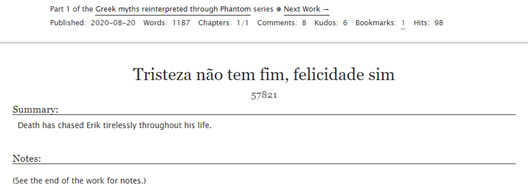
The only interaction I had with PBA/@wjsnsfriend before February 2021 was when I left a nice comment on her fic Tristeza não tem fim. I was excited to see that title and to read in the notes that she had been inspired by the 1959 film Orfeu Negro. The interaction we had in her comments is probably why she mistakenly thinks I am Brazilian. Because she assumes things without knowing anything.
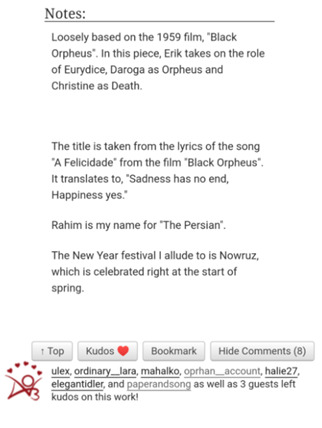
I’ve written two posts about this complicated film here and here. It is both one of my favorite films and also a deeply problematic piece of art. So problematic that Barack Obama wrote about his negative experience watching it in his book Dreams of My Father. In other words, it needs to be viewed with nuance. Nuance PBA did not lend Madame Faust’s work.
While Orfeu Negro is a Portuguese-language film, made in Brazil with an all Black cast, it was directed by a white French man, Marcel Camus. He was married to the lead actress, the Black American Marpessa Dawn, at the time of filming.

Among many issues with the film is a really awful and racist scene involving watermelon. I mention this scene in this post. [Photo after the cut]
I don’t criticize the quality of PBA’s fic or her use of Orfeu Negro as inspiration. I think the film is important enough to transcend the racism inherent in most films made at that time. But I find it extremely hypocritical that she would excoriate another author for addressing themes of slavery and racism in fanfiction while uncritically enjoying a film made by a white French man as problematic as this one.
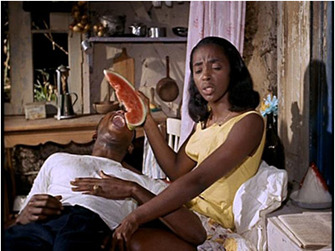
What was it about Madame Faust that really bothered PBA? And let’s not forget that PBA didn’t work alone. @trans-flint/ @cenfantomeenhabitnoir /elegantidler had a lot to do with PBA’s actions in February and March of 2021. They are both responsible for trying to destroy another author and to cause harm to as many people as possible within the Phantom of the Opera fandom. I wonder how long it took for them to plan it all out? From the tags in this post it looks like @trans-flint had some idea that he was going to start hurting people at least as of January 1 2021.

Why Madame Faust? Both PBA and @trans-flint wrote Pharoga fics and MF a was a popular Pharoga writer. And she is a nice person who they rightly assumed wouldn’t fight back. Within that MF call out post there was a long tirade about how all Pharoga writers are racist and Orientalist, again making assumptions about who Pharoga writers really are, completely ignoring non-white people in the PotO fandom.
I am not a Pharoga writer. PBA never came after any of my fics. I don’t think she even reads fic – not even MF’s fic beyond searching for some quotes to take out of context. I have often wondered why I was targeted by PBA - she wrote absolutely sickening lies about me – why was I even in her sights? Here’s what I think: PBA and @trans-flint went after people who shared common interest with them. I believe @trans-flint encouraged PBA to come after me because just a week before the MF post on February 25, I made a proposal for a PotO Paris Commune Week to be held in May. Clearly, he found this intolerable.
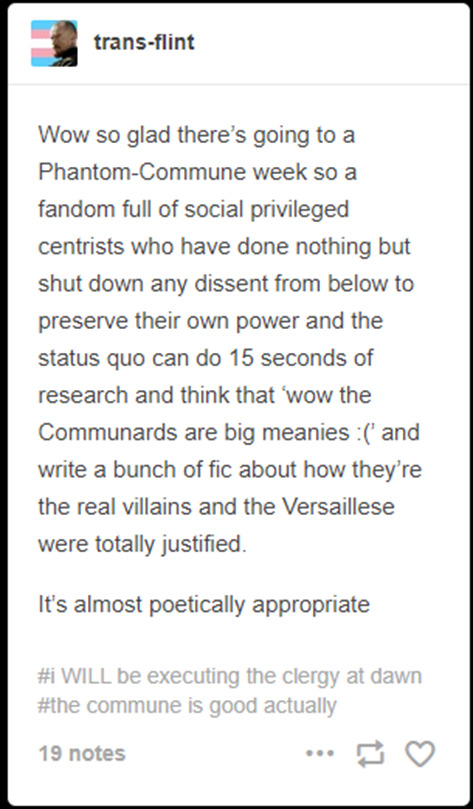
@trans-flint makes a lot of assumptions about the phandom and about how stupid he thinks we all are. The tags are interesting. While I am politically sympathetic to the Paris Commune, the execution of their 62 hostages was the worst thing they did and it damaged their reputation in history for decades. Leroux plays heavily upon this bad reputation too. Maybe the Commune was good – but executing hostages is always vile. Commune Week went really well, by the way. Even if PBA tried to spam the tag with some k-pop reblogs, because that’s not racist or fetishizing at all.
PBA reblogged this post from @trans-flint on March 5 2021 and she again insists that I am Brazilian and again tells lies about me.
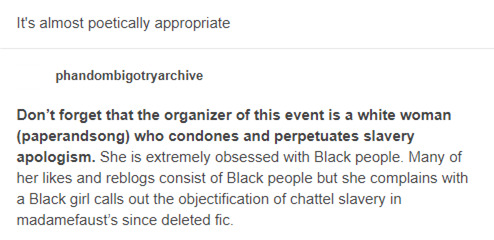

I have never tried to excuse the trans-Atlantic slave trade – and neither did Madame Faust. It’s all lies. It’s disgusting that she would say this. It makes a mockery of actual racism. There is racism in the PotO fandom, absolutely. But MF’s fic was not it.
I never complained about anything PBA did until August 2021. It took me a while to get some perspective on what happened. But I think I get it now. @trans-flint and PBA laid out that MF post like a trap. They created something so outrageous that it would horrify everyone in the fandom, even people just watching it unfold. They were probably always going to make a list – that post was just a way to collect names. If PBA actually cared about racism in PotO, she would be out here calling out those who have said awful things about Lucy St. Louis. But she’s not. Her work is done.
But they’ve already lost. Their list has been proven meaningless. It protects no one. Even PBA seems to have forgotten about it. And I think the phandom should too. Let @trans-flint drive himself crazy trying to update it without using excel.
#phantom of the opera#le fantôme de l'opéra#gaston leroux#black sails#wjsn#racism in fandom#poto#hypocrisy#see y'all in hell#pharoga#les misérables#good omens
29 notes
·
View notes
Text
Leroux details about Raoul’s family
Just thought I’d put together a list of some details that are sometimes forgotten
Raoul has a brother ( his full name is Philippe-Georges-Marie) and two unnamed older sisters
Raoul’s mother (whose maiden name was de Moerogis de La Martynière) died giving birth to him when Philippe was twenty.
Raoul’s father (Philibert) died when he was twelve. From then on, Philippe, his sisters, and Raoul’s old aunt looked after him and his education.
The Chagny family is very old, they go back to the time Louis X who was born in 1289. They also have a huge fortune.
When their father died, the Chagny sisters and Raoul gave their shares of the inheritance (the law that the first born son inherited everything was abolished by Napoleon) for Philippe to manage. Philippe gave the Chagny sisters their shares back as a dowry when both sisters both got married on the same day. There is no mention of Raoul receiving any similar gift so he was dependent on Philippe’s support for anything beyond his naval salary.
Raoul’s aunt was the widow of a naval officer and “gave young Raoul a taste for the sea”. Raoul was visiting her house when he met Christine. The aunt also asked Christine’s father to give Raoul violin lessons
Raoul “... seemed to have only just emerged from the influence of women. Indeed, cosseted by two sisters and his old aunt, his almost exclusively female upbringing had made him open and honest and given him a boyish charm none of which had yet rubbed off.”
Philippe did not want Raoul to marry Christine, he was dead set against it as it would cause a huge scandal.
Christine and Raoul eloped to Scandinavia
262 notes
·
View notes
Photo
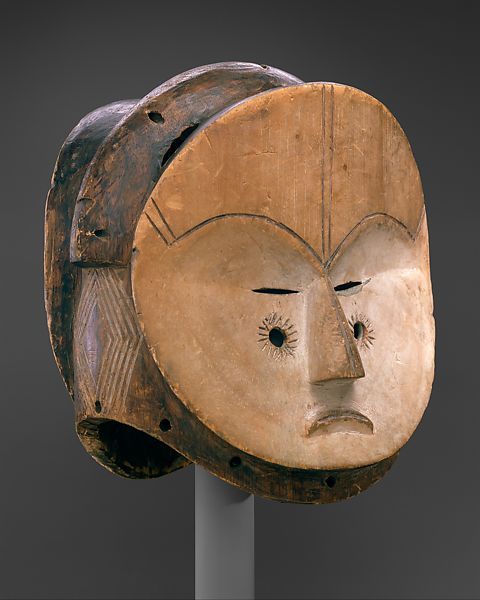
Janus-Faced Helmet Mask (Ngontang)Late 19th–early 20th century
Fang peoples
This Janus-faced ngontang helmet mask covers the full head of its wearer and is carved from a single block of wood. As a sculptural object, the mask is roughly accordion-shaped, with a ridged central section connecting a pair of relatively flat faces. At either side of the noses on each face, round openings embellished with radial incisions may, at first glance, look like eyes. More likely these are decorative "tattoos" adorning the cheeks, while slits flanking the bridge of the nose (functional eyeholes for the mask wearer) represent the eyes. The mask’s round and kaolin-lightened faces—with narrow noses, chiseled lines and eyebrows, and diminutive, frowning mouths—make it characteristic of its genre. Darker wood surfaces between the two faces are marked with shallowly engraved lozenge patterns and holes that once allowed feathers or other decorations to be affixed. Holes at the curved base of the mask once accommodated attachments for a raffia ruff or full-length costume.
In 1917, the Paris-based poet and critic Guillaume Apollinaire and the art dealer Paul Guillaume published this Janus-faced mask, then in Guillaume’s collection. Unusually for an early-20th-century catalog, Apollinaire and Guillaume’s caption offers relatively precise coordinates for the object’s origin, noting that it came from the banks of the Abanga River, among the Essissone "tribe" of the Pahouin "race" (colonial-era French writers referred to the Fang as "Pahouins"). Aside from the obvious obsolescence and inaccuracies of terms such as "tribe" and "race," Apollinaire and Guillaume’s attribution is more informative than might be expected. Likely given by a supplier in Gabon who acquired the mask in situ, the caption points to a Fang-Betsi group northwest of the town of Ndjolé, between the present-day Estuaire and Moyen-Ogooué provinces of northwestern Gabon.
From the second half of the 19th century through at least the first half of the 20th, masquerades called ngontang took root and evolved in Fang communities across present-day northern Gabon, Equatorial Guinea, and southern Cameroon. The etymology of ngontang (or nlo-ñgontang) appears to be a contraction of the Fang nlo ñgon ntañga: head (nlo) of the young girl or daughter (ngon/ñgon) of the European (ntañga; also ntanghe/ntangha/ntaña). Based on this name as well as on formal attributes, the genre is thought to have emerged in response to the European and American traders, missionaries, and colonial personnel whose growing numbers in Gabon and surrounding areas destabilized local social orders during the mid to late 19th century.
During and leading up to this early colonial period, Fang and other Equatorial and Central African peoples are widely reported to have drawn connections between—or indeed, conflated—Westerners and supernatural beings. The unusual physical appearance, novel technologies, and violently disruptive presence of Europeans and Americans in the region no doubt contributed to this pattern of belief, as did local associations of bodies of water (e.g., people arriving from across the ocean), and of the color white, with spirits and the land of the dead. The delicate features and light complexions of ngontang mask faces thus suggest both feminine and otherworldly qualities. Among approximately forty ngontang masks documented in major collections, some are single-faced, while others, in helmet styles, feature as many as five faces. Multiple faces may have served to indicate heightened powers of perception in the spirit realm and, when integrated into a costume ensemble, to impress audiences.
The 1917 caption published by Apollinaire and Guillaume also includes information about the mask’s public appearance, noting that it was danced "on nights of the full moon." Perhaps this reflects Fang associations of femininity with cycles of the moon: lunar motifs often adorn the faces of ngontang masks. In this example, moon forms can be seen in the circular openings with radial lines flanking each nose, as well as in the round contours of each face. However, neither the feminine identity nor the performance aesthetics of ngontang can be confirmed beyond a shadow of a doubt. For, even though ngontang masks were widely collected as early as the late 19th century and a number early-20th-century accounts of other Fang masquerades are known, there exist only two published field reports mentioning ngontang.The first report derives from ethnographic research conducted in the 1940s in what is now Equatorial Guinea. Perhaps surprisingly given the mask’s etymology, this report’s two documented masks (now held in the Museo Etnológic in Barcelona) seem unequivocally to embody men with facial hair. The same is true for a handful of other well-known masks associated with the genre, including a famous mask acquired by the French Fauve painter Maurice de Vlaminck in late 1905 or early 1906 (and soon thereafter sold to André Derain, now in the Centre Pompidou in Paris). Ngontang, in other words, seems to have variously incarnated not only female but also male white spirit entities.
The second report, based on ethnographic research conducted in Gabon’s northern Woleu-Ntem province, features a 1960 photograph of a ngontang masquerade that shows a four-faced, pointy-nosed ngontang with raffia ruff and skirt, dancing in the presence of five dancers and two musicians. The report notes that ngontang appeared at marriages, wakes, and other celebrations. It also includes a transcription of song lyrics accompanying the masquerade. These lyrics, although somewhat obscure, mention sickness and suffering as well as a character known as "the White." The field report concludes that ngontang embodies a European whose narrow nose shows off the sculptor’s talents, and whose rare presence in Fang villages can draw crowds.
Joshua I. Cohen, 2016
Published References
Apollinaire, Guillaume, and Paul Guillaume. 1972 [1917]. Sculptures nègres: 24 photographies précédées d'un avertissement de Guillaume Apollinaire et d'un exposé de Paul Guillaume. New York: Hacker Art Books.
Perrois, Louis. 2008. "Fang Masks of Equatorial Africa: Relationship, Diversity, Evolution." Tribal Art 13, no. 1: 96-113.
Further Reading
Binet, Jacques. 1972. Sociétés de danse chez les Fang du Gabon Paris: Office de la recherche scientifique et technique Outre-Mer.
Cohen, Joshua I. 2017. "Fauve Masks: Rethinking Modern 'Primitivist' Uses of African and Oceanic Art, 1905-08." The Art Bulletin 99, no. 2 (June):326–55.
Galley, Samuel. 1964. Dictionnaire Français-Fang, Fang-Français. Neuchâtel: Editions H. Messeiller.
LaGamma, Alisa, ed. 2007. Eternal Ancestors: The Art of the Central African Reliquary. New York; New Haven: Metropolitan Museum of Art; Yale University Press.
Largeau, V. 1901. Encyclopédie Pahouine. Congo Français. Éléments de grammaire et dictionaire français-pahouin. Paris: Ernest Leroux.
Lejeune, L. 1892. Dictionnaire français-fang, précédé de quelques principes grammaticaux sur cette même langue. Paris: A. Faivre et H. Teillard.
Panyella, Augusto. 1959. Esquema de Ethnologia de los Fang Ntumu de la Guinea Española. Madrid: Instituto de Estudios Africanos; Consejo Superior de Investigaciones Cientificas.
Perrois, Louis. 1985. Ancestral Art of Gabon from the Collections of the Barbier-Mueller Museum. Trans. Francine Farr. Geneva: Musée Barbier-Mueller.
———. 1979. Arts du Gabon: les arts plastiques du bassin de l'Ogooué. Arnouville-lès-Gonesse; Paris: Arts d'Afrique noire; Office de la recherche scientifique et technique outré-mer.
———. 2006. Fang, Visions of Africa. Milan: 5 Continents.
On view at The Met Fifth Avenue in Gallery 352
1 note
·
View note
Text
Searching for Books
I am sooooooo.... tired of this bullshit!
Like... I want some classic horror stories wrapped in leather or faux-leather binding so that they posses all the proper gravitas on my bookshelf, but nooooo!!!! Once you get into specific translations or whatever, your choices become so much more limited! And if you’re trying to order online? Good luck with that, because frequently they don’t even mention who did the translation!!!! Like ‘eh? why do you need to know the translator, you American you?’ Because I’m not an uneducated backwater pleb looking for just any classic! I want the translation that is unabridged and most-complete so that I can somewhat appreciate the original story with more of the spirit of the original publication!
Fuck the ‘Sorcerer’s Stone’, give me the ‘Philosopher’s Stone’! Give me the culture!
Like, what I really need is a compendium or set of books, hard-cover leather-bound, containing:
Bram Stoker’s ,Dracula... and/or the Icelandic... version... for lack of a better word, which sounds so marvelous: Powers of Darkness (Makt Myrkranna).
Robert Louis Stevenson’s, Dr Jekyll and Mister Hyde
Oscar Wilde’s, The Portrait of Dorian Gray
Mary Shelley’s, Frankenstein (this surname is German, it’s pronounced Frahn-ken-schtine)
H. G. Wells‘, The Invisible Man
and Gaston Leroux’s, The Phantom of the Opera (translation by David Coward)
0 notes
Text
Ooh I was tagged! 🖤
Rules: a) always post the rules, answer the questions then write 11 questions of your own b) tag 11 people and link them to the post c) tell the person who tagged you that you’ve answered your questions. @elizabethdaae made these questions:
1. Who is your favorite Christine in any Phantom adaptation? This is a little difficult. Surprisingly there are scads of adaptations that I've never actually seen. However, I did just recently see Sierra Boggess and something about her performance really gutted me.
2. If you could ask Leroux a question about Phantom, what would it be? There's a bit in Apollo's Lyre where Christine is talking about the couple of weeks she lived with Erik after the unmasking with the line: "what more can I tell you dear?" UM. A LOT. EVERYTHING, ACTUALLY.
3. If you could add the Persian to any adaptation of Phantom that he is not in, which would you? Definitely ALW, just because he'd be so much more visible.
4. How do you feel about the Universal remake of Phantom? The upcoming one? Honestly, I don't know if Universal has what it takes to get their franchise off the ground. I think they'll abandon the project before we get anything new. BECAUSE I AM PERPETUALLY CYNICAL AND BITTER ABOUT CINEMA IN THE USA
5. Which Phantom adaptation would you like to go back in time to see the premiere of? 1925, sneak preview if possible. FEED ME THE ORIGINAL FOOTAGE FOR GODSAKE
6. Would you change anything about the original novel? I would fix some timeline nonsense, I'd make Raoul a little more self-aware and I would have left a better hole for possibilities of Erik surviving at the end.
7. Would you like to see Susan Kay’s Phantom adapted to film? On the one hand, hell yes. Because phantom movies, holy shit. On the other hand, her shit is already accepted as canon by a lot of people and I feel like that gives my own fledgling phic a harder time. But that's just silly.
8. Who do you think would make the best Erik in a Leroux-accurate movie? My boy Doug Jones. I don't trust a regular leading man with my husband. Gotta be a monster actor. (Andy Serkis can audition but Doug is my first choice for obvs)
9. If they made a Phantom cookbook, what would Erik’s recipe be? Something that's a fusion of different Indo-European flavors like beef Bourguignon spiced with ginger, cumin and Aleppo pepper. Spicy flavors from the east and thick sauces from France.
10. What do you think the characters in the novel would think of Love Never Dies? HA! Meg Giry (age 15): screaming Madame Giry: disgusted Raoul: hurt... maybe even a little paranoid about the Phandom at large Christine: half intrigued but spends most of the play glaring at the asshole who wrote this crazy self-insert fantasy Erik: slips ALW 20 thousand francs and grins maniacally sees Christine glaring sees everyone else glaring "What?!?"
Hee hee! My questions:
1) what actors--dead and/or alive--would you like to see play The Persian Daroga?
2) favorite line from the novel (any translation)
3) a detailed account of exactly how you feel about Michael Crawford's voice
4) a detailed account of exactly how you feel about Sarah Brightman's voice
5) do you think Madame Giry in the NOVEL knows more than she lets on? Headcanon: how much more? As much as ALW thinks?
6) why do YOU think Erik built a mirrored torture chamber IN his house? If I'm reading the passages of the book right it's only accessible via a hole in the ceiling and a trap door in the floor. But several huge, heavy mirrors.... not to mention a metal tree and a frigging VIEW WINDOW INTO THE LOUIS-PHILIPPE ROOM. Like, Christine's private bedroom. Lol wat. I have questions, Erik.
7) what's your headcanon about the state Christine is in when she first hears The Angel of Music?
8) if money was no object and you were so inclined, what are some things YOUR OWN non-replica production would feature (i.e.: what would you do differently with the existing ALW musical)
9) who is your favorite Raoul from any adaptation and why?
10) some things that you love and loathe about Susan Kay's Phantom
11) any and everything you'd like to see for a new adaptation of Erik's background??? (Think of this as me taking requests. Kinda)
Everybody who wants to do this should! Also if I tag you and you don't wanna no worries. @chris--daae @bronze-and-navy-is-creating-1 @rjdaae @callme-c0nn0r @coulsart @rienerose @fdelopera @queenofthemorgue @romephantom @fantomexnoir @glimmeroniron @mistressmaeb @eriks-fedora @elizabethdaae @rue-scribe-siren @alvadee @embergeist @allthisandtea @inbetweeness @loudlewdlyricalmiracle @opera-ghost @viscountess @wolfgangamaderik
3 notes
·
View notes
Text
Notes on Gaston Leroux‘s „The Phantom of the Opera“ - Chapter 27: „End of the Ghost‘s Love Story“
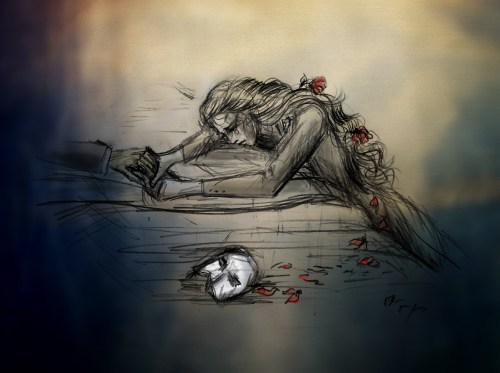
Artwork by @flaviamarquesart
<< Previous chapter
“End of the Ghost’s Love Story” is the most powerful chapter in the novel, because it reveals the full extent of Erik’s love for Christine. It is also the one that makes the story truly extraordinary, because it redeems his character and lifts him above the level of a gothic villain, who is usually defeated and punished in the end. This is why he is generally considered a “Byronic Hero” (https://en.wikipedia.org/wiki/Byronic_hero). The Byronic hero is a complex, often tragic form of romantic anti-hero who is generally more villain than traditional hero, but who has at least one redeeming quality (usually connected to love) which makes him a sympathetic figure despite his flaws and/or crimes. The character type was created by the English poet Lord Byron in his works such as “The Corsair” and “Don Juan”, and became extremely popular in the 19th century. Except for his looks, Erik fits that classic character type in almost all other aspects (highly intelligent, tortured, violent, ruthless, manipulative and driven by an all-consuming passion).
The chapter’s title also makes it clear that the whole thing is a love story at its core - everything in the novel happened because Erik fell in love with Christine. It is, and has always been, the story of Erik’s love - he is the one character we follow up until the end.
The final chapter is narrated by Leroux again, but it draws on what the Persian supposedly told him when he went to visit him in his flat in the rue de Rivoli. When the Persian wakes up after losing consciousness in the water, he and Raoul are resting in the Louis-Philippe room, and Erik and Christine are taking care of them. Raoul has already woken up before the Persian, and is now asleep again.
The room itself astounds the Persian in how ordinary and old-fashioned it looks, and how much it contrasts with Erik’s general appearance (remember that the Persian had never been in Erik’s house before). Erik explains to him that the furniture once belonged to his mother, which explains why the style is so different from his bedroom, which is decidedly more „Erik“. The Persian also wonders why Christine, who is moving silently through the room and then sitting down beside the fireplace, ignores both Raoul and himself when tries to call her. The Persian believes that Christine is reading “The Imitation of Christ”, which is significant and which I will come back to a little later. The “opposites” theme is also present in this scene again, describing Erik’s figure as black and a demon, and Christine’s as white and an angel. The Persian finally falls asleep again.
When he wakes for the second time, Erik has already delivered him back to his flat according to the promise he made to “his wife”. The Persian immediately sends to find out what happened to Raoul, and learns that Raoul has disappeared and that Philippe’s body has been found on the shore of the lake under the opera house. The Persian has no doubt that Philippe was drowned by Erik (or “the siren”), and decides to denounce him to the police. However, his testimony is ridiculed, and he - like Raoul - is taken for a lunatic. The Persian then decides to write everything down and later hands his manuscript to Leroux (which is what we’ve been reading in these last chapters).
When he has finished writing his account down, Erik comes to visit him. He is clearly unwell and described as weak, leaning against the wall and “pale as a sheet”. The Persian accuses him of murdering Philippe and wants to know what happened to Raoul and Christine, whether they are dead or alive. Erik denies murdering Philippe, but the Persian doesn’t believe him. We don’t really know the truth though, so the “murder mystery” has no definite resolution and turns into more of a side note.
Erik tells the Persian that he is about to “die of love” for Christine. As I’ve mentioned before, I believe that the most likely physical cause of his death would really be the gunshot that Raoul fired at him, and a possible infection following that injury which would lead to his precarious state of health as seen in this chapter. This could metaphorically also be described as “dying of love” (because he wouldn’t have caught that bullet if he hadn’t been in love).
After turning the scorpion, Christine begged him to save Raoul, and she had already offered before to accept his proposal if he gave her the key to the torture chamber, but Erik did not care then, because he did not believe her. But when she swears to him that she will become his “living wife”, it‘s different as he finally sees in her eyes what he has been hoping to see - Christine’s genuine commitment. She means to go through with her promise and is accepting him as her husband at that moment - and this is why her commitment is powerful enough to break through to him.
According to their agreement, Erik takes the Persian aboveground, but since Raoul probably wouldn’t agree to leave, Erik drugs him and locks him up in the dungeon beneath the fifth cellar. Then he returns to Christine, who stands calmly waiting for him. Erik suddenly feels “shyer than a little child” as he approaches Christine, but she does not back away from him. He tenderly kisses her forehead and is overwhelmed with how good it feels to kiss her, as no woman has ever allowed him to, not even his mother. Christine even leans into his touch a little, and remains close to him after the kiss, „as if it were perfectly natural“.
Fear and disgust are very powerful, primal emotions, but Christine‘s feelings for Erik are strong enough to overcome both. Considering that no one, not even the Persian, was able to even look at Erik’s face without horror, I feel that Christine must have cared very deeply for him, as she allows his kiss without fear and without recoiling from him at all, even after everything he has put her through.
He falls at her feet and starts crying of happiness, and seeing his tears, Christine starts to cry as well. Erik tears off his mask so that he won’t lose any of her tears on his skin, and still Christine shows no sign of horror or disgust. And she doesn’t only allow him to touch her, but she also touches him of her own free will and takes his hand, saying “poor, unhappy Erik”. I feel that this is the moment when the full expanse of his life’s tragedy truly hits her. She is not only the first woman, but the first person in his entire life to treat him with tenderness and acceptance.
Gratitude and love for her overwhelm him and make him realize that he has forced her choice. He puts the gold wedding ring into her hand, setting her free and telling her that he knows she loves Raoul and that she is free to go and marry him whenever she pleases. He „calmly cuts his heart to pieces“ and puts her happiness before his own in this final expression of true love and sacrifice. For as damaged as he was, the ending proves that Erik truly loved Christine because his love is ultimately selfless. There is also no bitterness in his feelings towards Christine after she leaves - he has always loved her, and still continues to love her. He still feels protective of her: “I’d better not hear that anyone has touched a single hair on her head!” Christine gave him “all the happiness in the world”, and he is grateful to her for this gift. His love for her redeems him as a character and proves to be his moral compass - before, he considered himself “outside the human race” and therefore not bound by common moral values.
In the previous chapter, Christine is shown reading what the Persian believes to be “The Imitation of Christ”. I don’t think that is a coincidence, and I also believe that the name “Christine” was perhaps even chosen for her on purpose (she was originally named Pauline, according to Leroux’s manuscript). Christine becomes a “Christ figure” here in two ways: through her sacrifice, she saves the lives of Raoul, the Persian and everyone in the Opera. But she also offers acceptance and love to a sinner, an outcast who has been shunned by society - and this is an extremely powerful gesture. She possessed the strength necessary to see Erik as a human being, and that is what sets her apart from everyone else. Her love here transcends the realm of romantic love and becomes almost divine - all-encompassing, forgiving, healing.
Christine may superficially fit the traditional image of a “damsel in distress”, but the would-be hero who was coming to rescue her didn’t get very far, nor could he do anything to save her. The only hero who saved Christine was Christine herself - and she also saved everyone else: Raoul, the Persian, everyone in the Opera, and Erik. Both Christine and Erik show incredible bravery in this chapter: Christine‘s bravery shows in her truly accepting Erik as a man and in saving Raoul, and Erik‘s bravery consists in letting her go, relinquishing his one chance in his life of having everything he has ever dreamed of.
Erik then goes to free Raoul and brings him to Christine, where Raoul and Christine kiss. Christine swears to Erik that she will come back to bury him with the ring, and then she finally kisses him before they leave.
Seeing Erik weeping and overcome with emotion, the Persian no longer doubts him. Erik tells the Persian that when he feels he is close to dying, he will send the letters that Christine had left with him and a few of her personal objects to him, and that this would be the cue for the Persian to put an obituary notice in the newspaper so that Christine and Raoul would know. Interestingly, that entire arrangement hinged on Erik himself announcing his death without anyone confirming it, because he could only mail things to the Persian if he was still alive. This leaves a lot of blank space for the reader’s imagination, because who knows if he really died…? The Persian, at least, never saw him again, but announced three weeks later that “Erik is dead”.
Next chapter >>
#phantom of the opera#lerouxreadingguide#leroux erik#leroux phantom#gaston leroux#le fantôme de l'opéra#erik in love#erik x christine#give erik a hug#the ghost‘s love story#the phantom#the phantom of the opera#erik the phantom#christine daae#byronic hero#gothic romance#classic literature#the persian#raoul shoots erik
66 notes
·
View notes
Text
Moments musicaux: high culture in the Paris Commune
Moments musicaux, by Delphine Mordey, covers the 1871 Paris Commune’s relationship to the Paris Opera. It does not address what the Communards were doing at the un-finished Garnier because at the time, the Paris Opera’s home was at the Salle de le Peletier. The Peletier is mentioned once in Leroux’s Phantom of the Opera in association with Sorelli’s mother, who had “known the glory days” of the theater, which had burned down by the time of the events of the novel.
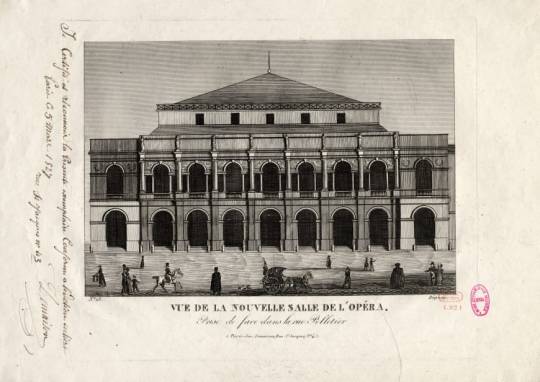
The Communards occupied the Peletier, both the building and the Opera staff, on May 1, 1871. The article explores their motivations for involving themselves in the affairs of the Opera during their short governance of Paris. It describes some of the administrative issues and also the four concerts at the Tuileries Palace, where both classical opera and café songs were performed for the open public.
I highly recommend the article to anyone interested in both the Paris Opera and the Paris Commune, and, tangentially, in Leroux’s novel.
The article ends with a section called “Phantoms of the Opera” which describes how the Versaillais army occupied the Peletier in the final days of the Commune and used it as a prison and execution site. This should make fans of Leroux’s novel pause as he claims it was the Garnier that held a prison for victims of the Commune, when it seems it was the opposite that was true. Mordey provides this chilling anecdote:
“As audience to these sinister scenes [the executions], several young [Versaillais] soldiers were resting on the steps to the left, the fatal side of the Opera. In idle curiosity, a handful roamed through the building, and discovered some accessories from Der Freischütz, the last production that theatre had staged before the start of the [Prussian] siege. The donned the skulls, masks and cloaks used for the wolf’s glen scene, and reappeared on the steps to watch the executions.”
I found this anecdote so awful and unbelievable that I even checked Mordey’s reference for the story. Witnessed by the Opera’s archivist Charles Nuitter, she pulled his testimony from an 1898 book called Guerre et Commune, impressions d'un hospitalier 1870-1871 by Louis Gallet.
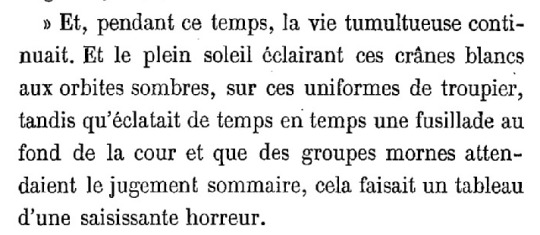
The Commune was over by the end of May 1871. The Peletier burned down in 1873. The Palais Garnier opened as the new home of the Paris Opera in 1875. The Commune haunts Leroux’s novel as it continues to haunt the actual city of Paris. Sometimes the truth is stranger than any horror story.
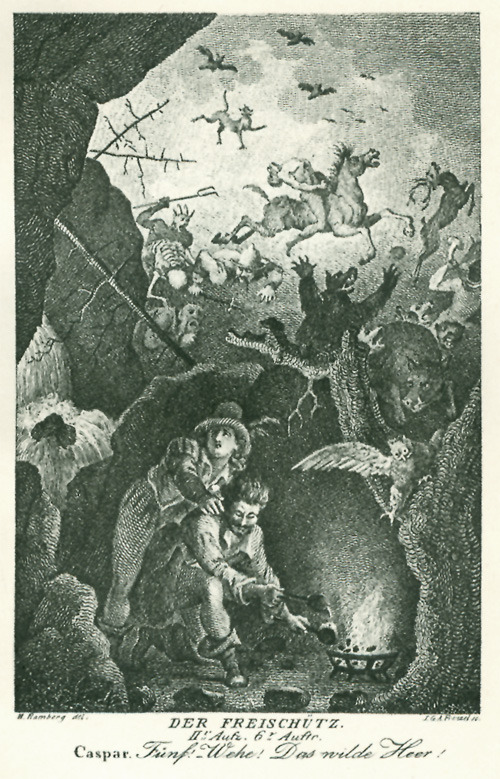
#der freischütz#opera#poto paris commune 1871#phantom of the opera#le fantôme de l'opéra#gaston leroux#peletier#palais garnier#paris commune#paris commune 1871#opera horror#deer
46 notes
·
View notes